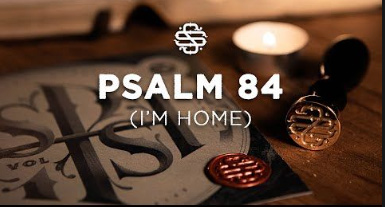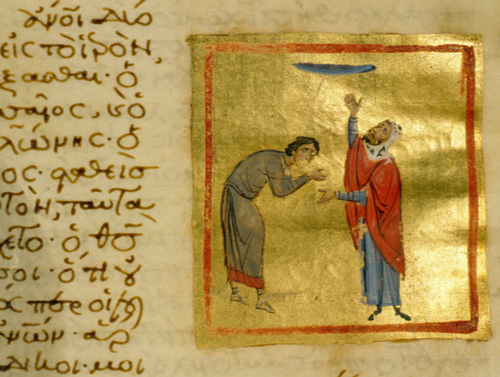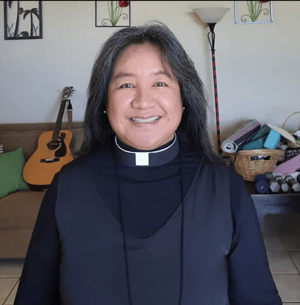I. Theme – Seeking Virtue in Lowliness

“The Pharisee and the Tax Collector”- Julius Schnorr von Carolsfeld (1794-1872)
The lectionary readings are here or individually:
First Reading – Sirach 35:12-17 OR
First Reading – Jeremiah 14:7-10,19-22
Psalm – Psalm 84:1-6
Epistle – 2 Timothy 4:6-8,16-18
Gospel – Luke 18:9-14
Today’s readings define lowliness and celebrate its virtue. Jeremiah speaks for God’s people, confessing their sin and pleading for God’s mercy. Paul looks forward to the reward of his many humble labors for the faith. In Jesus’ parable, two men come to pray but only the humble man leaves justified by God.
Our life of faith can be trying, at times seeming even meaningless. We feel the pressures around us and wonder where God is. Sometimes our own choices have taken us away from God; but God remains faithful to us. But it is up to us to turn back and see that God has been with us all along. We may leave God, but God cannot leave us. And if we stick with it, we will see that God has seen us through, all along.
Anne Lamott asserts that the essential elements of prayer are “Help, Thanks, and Wow.” Today’s readings involve a litany of praise – a spiritual “wow” at the many ways God moves in our lives and the world. God is always at work faithfully in the microcosm and macrocosm and the human and non-human. The only response we can make to God’s ubiquitous grace is praise.
II. Summary
First Reading – Jeremiah 14:7-10,19-22
Jeremiah 14 shows two voices: the first is the people, pleading for God’s deliverance because God is their God. The second is the Lord, who declares that since the people have left God, God has left the people, allowing them to experience rejection . The reading is preceded by six verses that describe a horrible drought that affects both rich and poor alike
Jeremiah uses the liturgical form of the communal lament, found in many psalms. He first describes his suffering, then confesses past sins. Israel is aware that she has done something wrong in light of the on-going drought. The petition is interesting. God is not asked to look at Israel’s repentance, but rather at God’s own reputation, “act O Lord, for your own name’s sake”!
Often there is a plaintive questioning of God, then an appeal to God’s own honor. ”! This questioning suggests that God has been absent, or even silent. God is described as a stranger, a visitor, someone who is confused. This unusual psychological approach is interrupted by an ejaculation of praise, “You, O Lord, are in our midst.” In the communal laments of the psalms, such an appeal seems to have been answered by an oracle of divine assurance. Here, however, the lord responds with a declaration of judgment.
Jeremiah intercedes on behalf of God’s people, not as an official spokesman or temple prophet (for he was rejected by the established religious authorities), but as one whose individual calling involves him in the fate of the nation. In verses 19-22, the people come back, asking God for mercy, acknowledging that they have fallen away and that the punishment they experience is their pwn rejection of God, entering into the absence of God. Now, they acknowledge that it is God who is the Creator, God who restores, and God who is the promise of hope. God is acknowledged, and the people can make their petitions about rain (salvation).
Israel confesses to a dependency upon God. How can God ignore them ?
First Reading – Sirach 35:12-17
The book of Sirach, also called Ecclesiasticus in older Bibles, reflects the teachings of Judaism in the second century BC. The author, Ben Sirach (50:27), describes himself as “one who devotes himself to the study of the law of the Most High” (38:34). Apparently, Sirach ran a religious school, a “house of instruction” (51:23), for those whose wealth afforded them such leisure. He set down in writing the content of his oral instruction about 180 BC. His grandson translated the work into Greek sometime after 132 BC.
By this time in Israel’s history Israel’s great theological battles about monotheism are over, the kings have come and gone, and the Exile is a distant memory. The prophets have been silent for a long time, and many Jews are living in cities where pagans are the majorities (although Sirach was written in Jerusalem). In these circumstances, writers asked how one should live a good life, what moral and spiritual choices should one make, what behavior is honorable in a religious person?
It was included in the Greek translation of scripture (the Septuagint, usually abbreviated LXX). Although not a part of the Hebrew canon of scripture, the work was highly valued both in Jewish and Christian circles. Thus it acquired its Latin title, Ecclesiasticus, “of the Church,” that is, to be read in church. It is the last major product of the tradition of wisdom literature (such as Job, Proverbs and many of the Psalms), and is an early example of the teaching that developed into the rabbinic schools of Judaism.
The central theme to this reading is justice, and impartial justice meted out by a righteous God
God stands in the midst of all of our pieties and mores and looks away from them to the true righteousness of justice
What are a worthy of sacrifice to God?
1 Keeping the law, observing the commandments (verse 1),
2 works of charity, giving alms (verse 2),
3 refraining from evil and avoiding injustice (verse 3).
What are unwelcome on the altar of God (the physical altar or any figurative one)?
1 Bribes and the fruits of extortion (verse 11).
2 Believing that if you are poor you will be shown partiality
Psalm – Psalm 84:1-6
This psalm resembles the songs of Zion (see Psalms 46, 48, 76 and 87) and the pilgrim Songs of Ascent (Psalm 120–124). Likely composed on the occasion of a pilgrimage to the temple, the psalm express the strength of the psalmist’s longing for the temple and the trials and rewards of the journey.
Psalm 84:1-7 sings praise of God who is our home, God who is our shelter, God who is the one who is our strength. God is the God of Creation, and in God we find our joy, our contentment, our being.
All find a home in the temple, even the humble bird, and all who make pilgrimage to come there. They are happy. The image is of the pilgrim making a journey to the temple, the pilgrim’s every thought being of the Temple. They journey across mountains, but it is Mt. Zion where they will find a home and see God
Epistle- 2 Timothy 4:6-8,16-18
Paul loved the young churchman Timothy and gave him encouragement and various instructions in at least two letters. Today’s is the last passage we’ll read from this source this year. It’s a kind of farewell from the senior apostle. He speaks of himself as one whose life is ebbing away, “poured out as a libation” (v. 6). 2 Timothy proclaims the grace of God’s protection.
2 Timothy 4:6-8, 16-18 contains familiar words of perseverance, of keeping the faith and finishing the race. Wreaths and crowns were worn by Jews as a sign of honor and joy at feasts and weddings; for Greeks they were a sign of a victorious athlete.
God is the source of protection and deliverance. The grace of God has protected the apostle in the “many dangers, toils, and snares” of life and God will “lead him home” to the heavenly kingdom From divine protection and sustenance, grace abounds.
When we see our faith through, sticking through with God when everything else around us fails us, we know that God will see us through to the end. Similar to the psalms of old, the writer shares that God will be their defender, their strength, and their endurance
The “lion’s mouth” (v. 17) is a common Old Testament metaphor for violent death; thus figuratively for the imperial power. Verse 18 seems to echo the lord’s Prayer. Paul acknowledges that his work is finished, and he looks forward both to God’s reward and Jesus’ return.
Gospel – Luke 18:9-14
In last Sunday’s sharp divide between a pompous and unrighteous judge and a persistent widow (two aspects of the social spectrum) Luke’s again lifts up the poor and the lowly by offering a commentary on prayer – prayer that comes from both ends of the spectrum.
Jesus uses the example of a Pharisee and a tax collector, figures that would have been common in his day—a Pharisee would have been someone who was respectable and a tax collector would have been despised; he uses these figures and flips the stereotype—the Pharisee ends up being the one who is self-righteous, looking pleased with himself and it is the tax collector who is humble, looking for forgiveness from God
Jesus’ parable contrasts two styles of prayer: the first, by the Pharisee, is loudly self-righteous. The second, by the tax collector (another social reject), is a plea for God’s mercy to a sinner. The prayers themselves are distinctive with the one emphasizing the innate righteousness of his situation, and the other recognizing his sinfulness. The Pharisee’s biddings all begin with “I am”, while the Publican simply acknowledges that he is a sinner. The Pharisee’s behavior is typical, attempting to outdo what the Mosaic Law required.
The Pharisee in today’s story seems truly thankful. According to the beliefs of the times, he shows an honest and laudable desire to contribute to the coming of the kingdom by fulfilling the law. Indeed, he exceeds the demands of the law. Fasting was required only once a year on the Day of Atonement. The Pharisees, however, fasted twice weekly, on Mondays and Thursdays. Likewise, the law required a tithe of all produce of grain, fruit and herd. The Pharisee extended his tithe to include all his income.
The tax collector, whose occupation branded him as an extortioner and traitor, knows he has no merits of his own. Using the language of Psalm 51, he throws himself on God’s mercy. It is he who is “justified” (v. 14), that is, accepted, made right with God.
Caught up in his self-made goodness, the Pharisee closes the door to the grace of interdependence on a power more loving than himself. In contrast, the Tax Collector knows that he cannot survive apart from divine gracefulness. He throws himself on God’s mercy, knowing that mercy alone can save.
Another distinction between the praying styles is the amount of time each gives to listening. The Pharisee is so busy extolling his virtues that God would be hard pressed to get a word in edgewise. The tax collector’s simple sentence leaves plenty of silent spaces in which God can speak.



 As Irene Maliaman notes in her retelling of this passage, Christians today should take heed of the parable’s lesson. She asks us to consider “a model Christian and a criminal [who] went to church to pray. Without hesitation, the Christian entered the church, dipped his fingers in the stoup that holds the holy water, made the sign of the cross, genuflected, and headed straight to his favorite pew in front of the altar. It is obvious that he knew what he was doing and was familiar with the place. Looking up, he lifted up his hands and prayed, ‘Thank you, God, for blessing me and making me unlike those corrupt and miserable sinners who cannot tell good from evil, who live their lives separate from you, who do not come to church, like that criminal over there. I read the Bible daily, I never miss church, I pray for the less fortunate, I fast twice a week, I advocate for justice and human rights, I support Episcopal Relief & Development and other non-profit organizations that are helping the poor, and I give my tithes.’”
As Irene Maliaman notes in her retelling of this passage, Christians today should take heed of the parable’s lesson. She asks us to consider “a model Christian and a criminal [who] went to church to pray. Without hesitation, the Christian entered the church, dipped his fingers in the stoup that holds the holy water, made the sign of the cross, genuflected, and headed straight to his favorite pew in front of the altar. It is obvious that he knew what he was doing and was familiar with the place. Looking up, he lifted up his hands and prayed, ‘Thank you, God, for blessing me and making me unlike those corrupt and miserable sinners who cannot tell good from evil, who live their lives separate from you, who do not come to church, like that criminal over there. I read the Bible daily, I never miss church, I pray for the less fortunate, I fast twice a week, I advocate for justice and human rights, I support Episcopal Relief & Development and other non-profit organizations that are helping the poor, and I give my tithes.’”

 We celebrate James day on Tues Oct. 23. He is known as St. James of Jerusalem (or “James the Just”). James was so respected by all, including even unbelieving Jews, that he was nicknamed “the Just”.
He is referred to by Paul as “the Lord’s brother” (Galatians 1:19) and the equal of the other disciples. Matthew provides some clues in Matthew 13:55 on his identity. “Isn’t his mother’s name Mary, and aren’t his brothers James, Joseph, Simon and Judas?” with the story of Jesus less than enthusiastic reaction in Nazareth.
Some have written that he was a half brother of Jesus, a son of Joseph and Mary and, therefore, a biological brother of Jesus. But others in the church think Paul’s term “brother” is understood as “cousin” or “kinsman,” and James is thought to be the son of a sister of Joseph or Mary who was widowed and had come to live with them.
James was not an instant believer in Jesus just because he was in his family. In Mark 3:20–21 we are told that people crowded around Him so densely that He and His disciples could not even eat. Seeing this, His family members, probably also including James, thought that He was out of His mind. On another occasion we are told plainly that His brother did not believe in Him. However, Jesus did not give up on James.
Along with other relatives of our Lord (except His mother), James did not believe in Jesus until after his resurrection (John 7:3-5; 1 Corinthians 15:7). Paul reports that Jesus miraculously appeared to James after his crucifixion and before his ascension, and this is the act which leads to James’ conversion. Once that happened he soon rose to distinction in the Church and became the Bishop of Jerusalem, even staying in Jerusalem ministering to his people during a period of intense Christian persecution.
He is known for his role in accepting the Gentiles. James was thrilled that members of the early Church were willing to welcome Gentiles into their flock, but he boldly proclaimed that they would be welcome as they are without any restrictions.
In Acts chapter 15, James was open to the radical idea that there are not limitations when it comes to God’s love. As presider over the First Council of Jerusalem, the decision was made Christians would no longer be considered as a sect of Judaism.
James decided that Gentiles should be able to join the Church just as they are. Some Pharisees insisted that all new converts needed to be circumcised. James believed there’s no need to place restrictions on their diet or acts of mercy shown on the Sabbath. There’s no need to be circumcised or become Jewish before converting to Christianity. James claimed that Jesus came to earth not only to give eternal life to him and those like him, but the entire world.
We have the decision of James. (Act 15:13-21). “What those Pharisees had demanded was not necessary.” They could cite their roots in the laws of Moses but not be bound by them.
James’ decision contradicted the accepted interpretation of Scripture at the time as well as centuries of accepted practice, teaching and tradition. In fact, James’ entire post-conversion lifestyle can be described as both radical and unpopular. God’s love is not limited to a particular group of people.
According to the historian Josephus, James was martyred in AD 62 by being stoned to death by the Sadducees.
James is considered to have authored the Epistle in the New Testament that bears his name. In it, he exhorts his readers to remain steadfast in the one true faith, even in the face of suffering and temptation, and to live by faith the life that is in Christ Jesus. Faith is active with the need to confess the Gospel by words and actions, and to stake one’s life, both now and forever, in the cross.
We celebrate James day on Tues Oct. 23. He is known as St. James of Jerusalem (or “James the Just”). James was so respected by all, including even unbelieving Jews, that he was nicknamed “the Just”.
He is referred to by Paul as “the Lord’s brother” (Galatians 1:19) and the equal of the other disciples. Matthew provides some clues in Matthew 13:55 on his identity. “Isn’t his mother’s name Mary, and aren’t his brothers James, Joseph, Simon and Judas?” with the story of Jesus less than enthusiastic reaction in Nazareth.
Some have written that he was a half brother of Jesus, a son of Joseph and Mary and, therefore, a biological brother of Jesus. But others in the church think Paul’s term “brother” is understood as “cousin” or “kinsman,” and James is thought to be the son of a sister of Joseph or Mary who was widowed and had come to live with them.
James was not an instant believer in Jesus just because he was in his family. In Mark 3:20–21 we are told that people crowded around Him so densely that He and His disciples could not even eat. Seeing this, His family members, probably also including James, thought that He was out of His mind. On another occasion we are told plainly that His brother did not believe in Him. However, Jesus did not give up on James.
Along with other relatives of our Lord (except His mother), James did not believe in Jesus until after his resurrection (John 7:3-5; 1 Corinthians 15:7). Paul reports that Jesus miraculously appeared to James after his crucifixion and before his ascension, and this is the act which leads to James’ conversion. Once that happened he soon rose to distinction in the Church and became the Bishop of Jerusalem, even staying in Jerusalem ministering to his people during a period of intense Christian persecution.
He is known for his role in accepting the Gentiles. James was thrilled that members of the early Church were willing to welcome Gentiles into their flock, but he boldly proclaimed that they would be welcome as they are without any restrictions.
In Acts chapter 15, James was open to the radical idea that there are not limitations when it comes to God’s love. As presider over the First Council of Jerusalem, the decision was made Christians would no longer be considered as a sect of Judaism.
James decided that Gentiles should be able to join the Church just as they are. Some Pharisees insisted that all new converts needed to be circumcised. James believed there’s no need to place restrictions on their diet or acts of mercy shown on the Sabbath. There’s no need to be circumcised or become Jewish before converting to Christianity. James claimed that Jesus came to earth not only to give eternal life to him and those like him, but the entire world.
We have the decision of James. (Act 15:13-21). “What those Pharisees had demanded was not necessary.” They could cite their roots in the laws of Moses but not be bound by them.
James’ decision contradicted the accepted interpretation of Scripture at the time as well as centuries of accepted practice, teaching and tradition. In fact, James’ entire post-conversion lifestyle can be described as both radical and unpopular. God’s love is not limited to a particular group of people.
According to the historian Josephus, James was martyred in AD 62 by being stoned to death by the Sadducees.
James is considered to have authored the Epistle in the New Testament that bears his name. In it, he exhorts his readers to remain steadfast in the one true faith, even in the face of suffering and temptation, and to live by faith the life that is in Christ Jesus. Faith is active with the need to confess the Gospel by words and actions, and to stake one’s life, both now and forever, in the cross.


